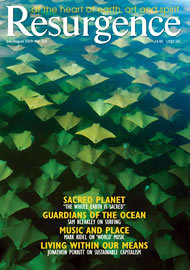Van Jones is an African-American activist with a beautiful truth on his side: “There is nothing so powerful as an idea whose time has come.” The idea in question is the answer to two of our biggest problems: climate change and the failing economy. What Jones and an increasing number of voices in the US propose is to drive eco-nomic recovery through a massive uptake in renewable energy, energy efficiency and other methods of greening the economy, and by doing so to decouple the economy from fossil-fuel dependency. Jobs and industry flourish, energy costs reduce, energy security increases, and not only does the economy recover, but it is built on rock instead of sand. As Jones states, there need be no choice made between looking after the immediate needs of our children, and the longer-term needs of our grandchildren.
In the opening chapter he guns down the “false options”, with the kind of neat expressive ability that Americans have in spades. Nuclear, corn-based ethanol and ‘clean’ coal get the treatment they deserve. He exposes the motivations behind these desperate manoeuvres by the conventional energy industry to convince us to make the same mistakes all over again. Importantly, when setting out what he considers to be the real solutions, and the green jobs they can create, he shows that their varied nature gives us the opportunity to fold into this programme our deeper values of inclusion, diversity and equal opportunity.
Jones defines a ‘green collar job’ as “a family-supporting, career-track job that directly contributes to preserving or enhancing environmental quality”. It is clear that a green job is one which seeks inclusion, pays a decent wage and allows for advancement. This focus is partly due to the desire to make the entry points as wide and accessible as possible, opening the green economy to everyone from the young, the long-term unemployed and ex-offenders to top engineers and scientists. The benefit is to run a green thread throughout society, creating more economic stakeholders in the overall greening of the economy.
Jones is, among other things, founder and president of Green For All, an NGO dedicated to advancing the green collar jobs agenda. What is refreshing about his work is that it does not stop with lecture tours. He works with many groups to promote this strategy, and although his book was written before the US elections, it is clear that Obama will be making his work easier. Obama’s platform included the central issue of greening the economy – following Jones’ logic and prescriptions.
Race is an interesting element of the book. Jones rightly points out that the environmental movement has long been white, middle-class territory. His description of the aftermath of hurricane Katrina is chilling for its racial dimension, as is his retelling of the outcomes of exclusionary policy-making – even the victories had serious downsides for non-white, non-wealthy people and neighbourhoods. The environmental justice movement is most associated with bringing racial issues to light, but is still largely divided from the mainstream environmentalist movement.
Jones lays this out as he takes us through the three waves of environmentalism: conservation, regulation and investment. He suggests that the first two did not get us where we need to go, and that by letting the markets loose on green products and services – while keeping conservation and regulation in sight – we can use the third wave to make it in the interests of far more people to redirect money flows towards eco-friendly economic activity. In addition, he sees this wave as the one where we get truly inclusive decision-making processes, which balance the needs and wants of all stakeholders, not just those with traditional access to the table.
Jones now has every chance to see his vision mark itself deeply on not just the American stage, but the global one. Nations are seeing that our multitude of common but differentiated woes, brought about by unsustainable thinking and doing, can all be addressed by the same approach. Jones believes we have every chance of turning things around, and applying these humbling lessons to our future choices.
Miguel Mendonça is research manager for the World Future Council and author of Feed-in Tariffs.







